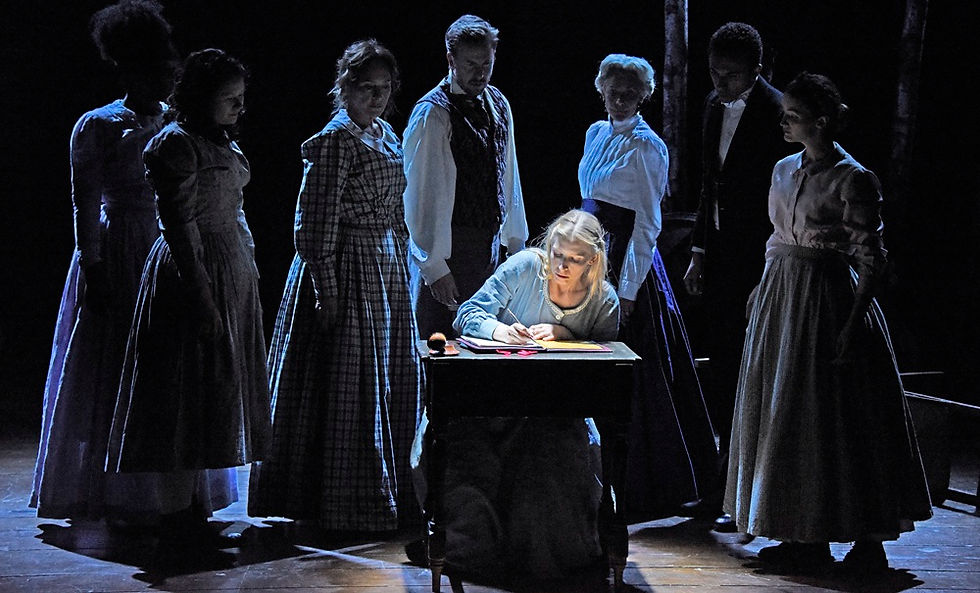After Sunday | Belgrade Theatre
- Alex Shinnick (she/her)

- Oct 17, 2025
- 3 min read
Walking into the Belgrade Theatre’s intimate B2 thrust studio, I was met with the inviting glow of a brightly lit community kitchen. Four metal work tables on wheels stood neatly arranged, each topped with plastic bowls and utensils. Cupboards were labelled with practical items while colourful Caribbean flags were strung proudly across the space. It was warm, familiar, and distinctly communal, reminiscent of a village hall where people gather to share meals and stories.
But, as with the play itself, the set, designed with exquisite detail by Claire Winfield, held deeper meaning beneath its surface. Above the cabinets, hidden among the everyday order, were neglected cupboards labelled with words such as ‘oppositional defiant disorder’, ‘manic’, and ‘narcissistic’. Beneath the stage, boxes bearing the characters’ names and shelves of books about mental disorders suggested the hidden weight of diagnosis and identity. Suspended above it all, a stained cloth marked with dark blotches evoked both burn marks and Rorschach’s psychological inkblot test.
Perhaps this wasn’t a simple community kitchen after all.

The show began with pulsating, rhythmic beats from Xana’s evocative sound design. Through a harshly lit corridor behind a large blue door, the characters emerged in a sequence of charged, physical movement, a striking introduction choreographed under Corey Campbell’s direction. These movements, abstract yet expressive, hinted at inner turmoil: struggles to break free, flashes of violence, moments of resistance. Though much of the play is grounded in naturalism, these bursts of movement punctuate the story marking shifts in time and emotion, articulating what words cannot.
We meet Naomi (played with infectious energy by Aimee Powell), an Occupational Therapist full of enthusiasm for her new cookery class. Her passion for helping others is palpable, but beneath her optimism lies an unspoken tension. Among her group are Ty (Corey Campbell), whose loud and defensive bravado masks deep pain; Daniel (Darrel Bailey), quiet and cautious; and Leroy (David Webber), wise yet fragile. They await Vincent, a key member of the group, but when it becomes clear that he will not be joining, the true context of their sessions, and the weight of their circumstances, slowly emerges.
As Naomi guides the men through their cooking sessions, food becomes a tool for healing, memory, and reconnection. The use of live cooking is not just a theatrical flourish, it brings smell, texture, and warmth into the space, blurring the line between performance and lived experience. It’s a sensory reminder of humanity, of comfort, and of care. At several moments, the emotion in the room was palpable. Were they cutting onions up there? Because by the end, there wasn’t a dry eye in the house.

The performances are uniformly excellent. Each actor brings sensitivity and depth to characters who are more than the labels society gives them. Their stories, inspired by real experiences of people who have been inpatients in secure hospitals and those who have worked within them, are handled with honesty and compassion. The production resists sensationalism or sanitisation, instead revealing the humanity behind the statistics, particularly the overrepresentation of Black men in mental health systems.
After Sunday is a powerful collaboration between the Belgrade Theatre and the Bush Theatre, embodying their shared commitment to telling diverse stories “created with, by, and for our local community.” It gives voice to those too often unheard, reminding us, as one contributor with lived experience expressed: “Yes, I have a diagnosis. Yes, I’m under a section. But I am human.”
This is a piece of theatre that nourishes the soul as much as the senses; raw, tender, and profoundly human. I cannot recommend it enough.
After Sunday plays at the Belgrade Theatre until 25th October 2025.
★★★★★ (5*)
Gifted tickets in return for an honest review | Photography by Nicola Young Photography







Comments